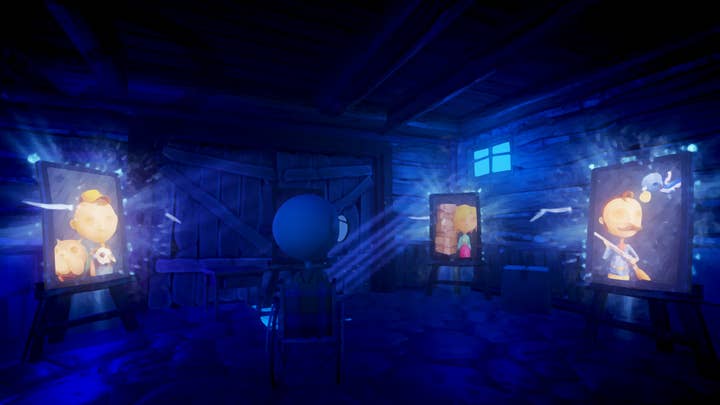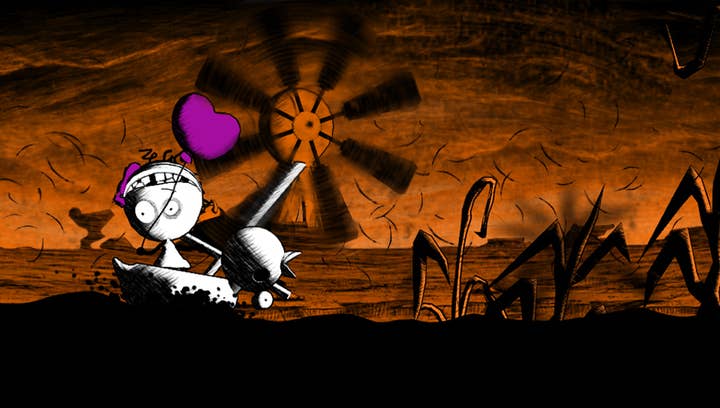Ovosonico: Games will be "like the Netflix button on your remote - that easy"
CEO Massimo Guarini on preparing for the horizontal expansion of the industry, and the Italian studio's pivot into indie AAA
At a huge trade show like E3, PAX, or Gamescom, there are essentially two types of games: massive, AAA productions, and indies that have either been picked up by a major publisher, or that are clustered in a booth together via IndieCade or a similar endeavor. There doesn't seem to be much wiggle room in between for now, but Massimo Guarini, founder and CEO of Ovosonico, thinks it's time for that to change.
Ovosonico recently announced it was moving from its former headquarters by the shores of Lake Varese to a new, larger studio in Milan. The move was necessary to accommodate a team that's expected to double in size over the next two years from its current roster of 25 to 30 members. This growth is just one piece of a studio-wide shift for Ovosonico from small, independent developer to what Guarini refers to as a AAA indie.
"It's focusing on what matters, and making sure that what matters in the game is top quality level. It involves saying 'no' to a bunch of other things"
"We are facing a moment in the history of the market where we see that the gap between big-budget productions and indie is getting wider and wider," Guarini said. "You see more people jumping in, because the barrier of entry is fortunately much lower, but that's also causing a multitude of super small studios or even individuals getting to make independent video games and saturating the market, while mid-tier studios are moving toward the AAA side of the industry; trying to get noticed, and to make sure that the production values are up to par with the multitude of studios competing in the same market space.
"So there's this sort of hollow space in between, and that's probably where the 'indie AAA'... thing comes into play. We believe there's going to be a place for boutique studios that are willing to grow and make sure they can actually produce games with the same level of quality as AAA, but with a much more focused game design and approach. That leads to unique products, because you can be on the same shelf as a AAA product but with something that's much more elegant and focused in scope and experience as a whole."
A more "focused" experience is what Guarini sees as the most important component of the niche he intends to fill. His studio won't have the budget of AAA game, so it can't spend resources on extra features or components that have become mainstream for big-budget games. Yet the experience still needs to stand shoulder-to-shoulder with those products.

"The keyword here is focus," he said. "It's focusing on what matters, and making sure that what matters in the game is top quality level. It involves saying 'no' to a bunch of other things. Saying, 'Do we really need that? Do we really need that other thing?' You have a perfect design when you realize you cannot remove anything else. And you can apply that rule to anything in terms of design.
"I have in mind a game where the core concept idea is what makes the game unique and everything should revolve around that core concept idea. So we need to be able to focus all our production bandwidth and efforts in terms of quality on that core feature.
"[Ninja Theory] really focused on something that was important for [Hellblade] and built everything around it, and that allowed the team to concentrate all their bandwidth on that feature and make sure it was up to par with other productions."
"Ninja Theory just proved that there's space for these kinds of productions, and proved that it makes financial sense"
Up until recently, Ninja Theory has served as one of the few examples of studios filling the gap that Guarini described. Hellblade: Senua's Sacrifice sold one million copies across all platforms as of last month, and received acclaim from the critics. Though Guarini obviously can't speak to the inner questions of how the studio achieved its success, he sees it as proof that Ovosonico can pull off the same kind of model.
"Ninja Theory just proved that there's space for these kinds of productions, and proved that it makes financial sense. There's still a range of budgets we can work within, and the independent AAA is anything within the $5 to $15 million range. That's normally a range where people don't invest, because you've got the $1 to $2 million projects and then you jump to $25 million or bigger than that. That's normally a more comfortable zone for publishers.
"[Ninja Theory is] exactly the kind of example the industry needs. It's not like they invented anything new, but business-wise it's good to see that someone is trying to fill the gap, and it's a great way to make sure the industry as a whole can start having more shades than just super big or super small. That will drive the industry to be closer to movies and music in terms of production and business models."
Ninja Theory also proved to Guarini the power of AAA indies to deliver a message to the mainstream, in a way that smaller indies cannot.

"One of the most important things is being aware of what kind of product you're making," Guarini said. "[Ovosonico's upcoming project] was a conscious choice. It was not like, 'let's make an artsy kind of experience.' For me, it's all about trying to reach the mainstream market with your own DNA. And in order to reach the mainstream market, you need to be able to compete on a quality level that is comparable to AAA. There are so many examples in movies where you perceive the product as a high quality product, but it's actually an indie product. But it competes on the same level as bigger productions.
"In order to get noticed, in order to make sure your message can reach broader audiences, you need to enter the mainstream market. We don't want to do that by making just a simple shooter game or a clone of other games. We cannot compete with Ubisoft. We cannot compete with Electronic Arts or Activision. That's not our goal. I want to get my message out to [the mainstream] just like all the other AAA games. But if you want to play in that league, you have to raise the bar."
"When games are like the Netflix button on your remote - that easy - that's the day when content is the distinctive part of the equation"
Even though Guarini sees Ninja Theory as a model, he isn't phased by its recent acquisition by Microsoft. Nor is he unwilling to make a similar move in the future if it makes sense for the studio. For Guarini, it all comes down to what's necessary to make the game he wants to make.
"I'm not against that sort of thing if an acquisition is done to make sure a studio can grow and have access to more resources. It's about making sure that an acquisition or partnership or whatever you want to call it makes sense for both. And especially that it isn't a wholesale acquisition to shut down the studio, but is a company saying, 'I want to invest in you.' Losing a bit in terms of shares doesn't mean a thing isn't yours anymore.
"I think the Microsoft acquisition was positive for [Ninja Theory] and Microsoft as well, and they jumped in as soon as they saw a studio capable of delivering this type of independent AAA experience. That's exactly, from a strategic point of view, what Microsoft really needed."
But an acquisition may not be necessary by the time Ovosonico is done with its next project, which Guarini anticipates will take anywhere from three to five years. The industry, Guarini says, is expanding horizontally, just as the film and music industries already have. With that expansion comes a broader gaming audience with a greater appreciation for different types of content, and he believes the kinds of games he makes will be there waiting for this ever-growing audience.

"We are witnessing a moment in the video game industry where the market is expanding, and it's becoming a little bit more horizontal than before," he said. "Obviously the barriers of entry for technology are still really high; it's not easy for non-gamers to jump in and buy a console or install Steam on a PC and make sure that the game works. But we'll eventually get there, and we need to be ready. And when games are like the Netflix button on your remote - that easy - that's the day when content is the distinctive part of the equation. Games are going to be ubiquitous like movies and music are today. It's a matter of time to me, and we want to be ready."
"The problem is not what we have, it's what we don't have. Why not build and deliver on different subjects and a wider range of emotions?"
Even though the kinds of games Guarini wants to make are targeted toward that expanding market, he has no intention of discounting people who already love games. In fact, he sees plenty of room within the existing games market to reach a broader audience than one might expect.
"Still today we're receiving messages from people who played Last Day of June. One of the last messages we received was from a 25-year-old male. He said, 'I play Call of Duty, I'm 25-years-old, and you made me cry you piece of shit.' That was the message! I was shocked. I laughed a lot, but I was shocked. You're saying, basically, you're not the target of this game. You're probably a super-male gamer who likes adrenaline and shooting, you probably don't like a game where you talk about love stories and cry, but then you played it. And you took the trouble to write to me. That's really important, because it's just a matter of expanding genre.
"The problem is not what we have, it's what we don't have. Why not expand? Why not make sure we can build and deliver on different subjects and a wider range of emotions?"
In the end, what matters to Guarini is that he is able to spread the message of his games far and wide, whether the recipients are traditional gamers, those already interested in his more emotive work, non-gamers, or anyone else.
"The most exciting thing is to be able to deliver my message to anyone in the world. When you make a record you're addressing anyone, because everyone listens to music. When you're shooting a movie, you're still probably addressing anyone in the world because watching a movie is simple and anyone can watch that. But for video games, no. For video games, it's not like everyone is playing video games. We're contributing in a way to make sure we actually get there... It's just a matter of being ready."
